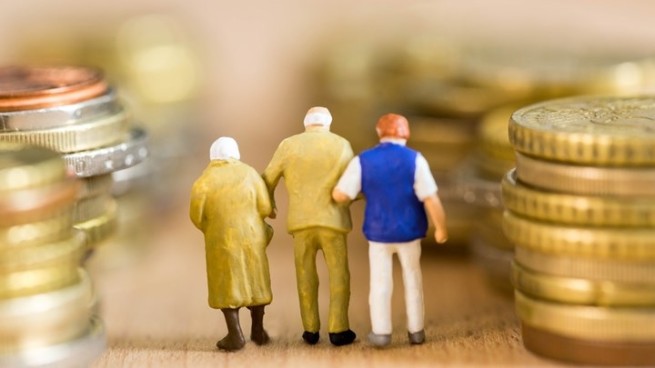“Inflation, rising prices” – these are two words that we constantly hear on TV, see on information sites and in newspapers, and which constantly give us a headache and leave… our pockets empty.
“How will this month turn out?” is a question that worries many Greek families, even if both parents have jobs. Maybe “children's” obligations, from tutoring to sports activities, and especially because of the summer, are postponed, but their place is taken by new expenses arising from tax obligations (ENFIAdeclarations, etc.), making the question of survival a “protracted marathon” for all of us.
“A few days ago, leaving the supermarket, I looked at the receipt and wondered how I managed to pay about 30 euros for a half-empty bag that only contained cleaning products?! How much would I have paid if I had also filled my cart with food or other goods? On the way home, two other troubles were waiting for me at the mailbox – the electricity and water bills. In a few minutes, triple the amount is gone from my pocket. The next morning, you get behind the wheel and realize that another 20 euros will “disappear” at the gas station. You look at the calendar, and it's still the beginning of the month! You need to pay rent, utilities, put something aside for urgent needs … Go on vacation for three or four days, run away somewhere is not possible. And we are talking about constant standard costs. And this is despite the fact that I do not include in them anything unexpected that can happen to each of us, from damage to a house or car to a visit to the doctor “- writes the confessions of one of the interviewees in the Greek publication parallax.
Percentages, figures, economic analysis. It is impossible to list how many surveys come in every week describing the galloping inflation in the country.
According to the latest consumer behavior survey by the Athens University of Economics and Business (OPA), Greek households spend 70 euros every time they shop at a supermarket, an amount that has increased by 14.7% compared to last year's 61 euros.
Likewise, the average monthly expenditure is estimated at 370 euros, which is a corresponding increase compared to 324 euros last year. 75% of consumers spend up to 450 euros per month. The increase in spending on visiting the supermarket reflects solely the rise in food prices due to inflation, since the basket remains half empty.
It is significant that in addition to eating out and food delivery (delivery), which are now a luxury for half of consumers and are practically excluded from their daily lives, 4 out of 10 have limited their consumption of meat and meat products, as well as wine, beer and spirits due to rising pricesThe same applies to 3 in 10 when it comes to consuming packaged standardized foods, as well as soft drinks and juices.
“The Greek summer – a citizen's right or privilege? Let's leave that to the experts. Let's give the floor to the people next door. How, for example, does a guy who moved from the village to the city cope? How does a single-parent family cope, how does a couple with four children cope? How do older people manage to maintain two, or maybe even three or four houses, covering their expenses and supporting their adult children financially? How much does a child cost?
All these questions were answered by citizens “living next door to us,” writes the above-mentioned publication.

Story one: “To survive alone… no matter what.” Yiannis is 27 years old, originally from Kastoria, but after finishing his studies he lives and works as a private employee in Thessaloniki. “I live alone. I thought about living together to “split” the expenses a little, but I couldn't find the right person I could trust… I rent a ramshackle house… Sometimes I feel resentful of life and want more space… But imagine that there is another person hanging around here. Brrr…
So, the expenses are normal. Rent, internet, electricity, water, utilities, supermarket, etc. In winter, you sleep in an unheated apartment and go outside in a “double set of clothes”… Why turn on the air conditioner to warm up? These are unnecessary (unacceptable) expenses.
I go back and forth when I can to the village to get food from my mother, who cooks it in a container and freezes it. But how can it compare to hot food out of the oven? I cook occasionally, but usually I don’t have much time. I control my expenses, but it also helps that I know that some days I will have food ready at home. And even to heat it up and eat it, and I don’t have to go to the supermarket to be full… I don’t ask my parents for money, although they are ready to give it to me. They covered my expenses during the years I studied here, I don’t want to burden them anymore.

Story two: “Home, work, home and… expenses.” It really bothers me when in such reports I always see the headlines “How a family makes ends meet” and I see how two parents work, bringing home two salaries. Honestly, my mind “goes beyond reason” when I see not some specific people (how neighbors and acquaintances live), but “generalized” figures.
“Have those who make these reports taken into account that there are many single-parent families in our country?” says Eleni, 37, who has a 7-year-old daughter. “I am alone in the whole world. Me and my child. I have no relatives who could help, and my ex-husband has cut off all contact in recent years. My daily life is home, work, home. My “walks” with my daughter to the supermarket, to the tutoring school where I take her and bring her back, a trip “to visit” her friend. That's all the “entertainment”.
Rent, bills, tutoring… Now that summer has arrived, I'm looking at what I can put aside for the winter. I get 800 euros, 350 go towards rent, and the rest goes towards supermarkets, electricity, internet, etc. There are months when the money doesn't come in. And then I have to delay payments… I can't afford unnecessary expenses for myself.
I buy clothes on sale, and that's because I need them. But the child grows, gets taller, and needs different clothes every year. This year she won't be able to wear the same clothes she wore last year, and that's not an aesthetic problem, but a purely practical one. Vacation is an unfamiliar word for me. The child should (but can't) go to camp for two weeks to have some fun. And then every Saturday I take her to the sea on the KTEL bus to swim. That's how life goes…

Story three: “You don’t look at brands anymore, you only buy what’s cheaper.” We have 6 people living at home. Me, my wife and four children. We both work, we are healthy, we bring home money, but we would like more comfort. What is the point of watching every month how “this is going to be that” (barely making ends meet). And thinking about the fact that you essentially have no opportunity to provide for the future of your children?”, – 45-year-old Tasos tells us.
“The house we live in is owned by my father, so there are no rent or loan expenses. But we are talking about six people living in the house. One salary goes to the supermarket, and half of the second salary goes to other obligations. We have reserves from previous years, and this is because we made sure to put some money aside, and we could have spent it with my wife on a trip, but we did not. For example, you will no longer be able to buy fish to eat every week. Sardines are a more “popular” fish and if you can find them they can cost up to 12 euros per kilo. You forget about visiting taverns, etc. If everyone takes a portion, then the bare necessities will cost 60 eurosAdd a salad and an appetizer and it will come to 100 euros.
To pay for one meal the amount you would pay for a month?! It's unthinkable… That's why you have to “hunt” for discount promotions and “good offers” in the supermarket.
You don't look at branded items anymore, just at what's cheaper. And you buy when you get two or three at a bargain price.
But the other expenses can't be put off either. All my children go to school, they need tutors, money for clubs and sports. What will happen in a couple of years, when they go to high school? I don't know what will happen next. This is not life, but hard labor, when you only think about how to survive.
Story number four: “It doesn’t matter if we eat the same food for two or three days.” The heroes of this situation are none other than the parents who are now retired and who are saving on everything, trying to help their adult children. “My husband and I have a combined pension of 1,200 euros. We don't have rent, we don't have a loan, but our house is old and it's starting to deteriorate. So a certain amount will go towards these needs every month,” says Ms. Evanthia, 66. “Maybe there are only two of us now, but there are months when the expenses can be more than you expected. We don't buy clothes, shoes, but we go to the doctor. And if you need some tests… We don't make allowances for health. At the supermarket, we only buy the bare necessities. It doesn't matter if we eat the same food for two or three days… We also don't mind if one week we eat only beans, rice, spaghetti, and the next week we eat meat. We have two other houses – our children's families. They also have a hard time making ends meet. What can't we do to help them? You go to the market and buy them their fruit, so that they don't become even more burdened. They have current loans, their own obligations…
You still need to give your grandchildren pocket money… And then the end of the month comes, and you check the “accounting”: income – expenses. What is left, what to put aside for the future (save now, so that something is left “for a rainy day”? You take paper, pencil and, as they say, with God's help… That's how we live.”








More Stories
The issue of raising the retirement age is back on the agenda
Growth rates of private label sales in supermarkets
Moody's: Greek economic outlook upgraded to positive